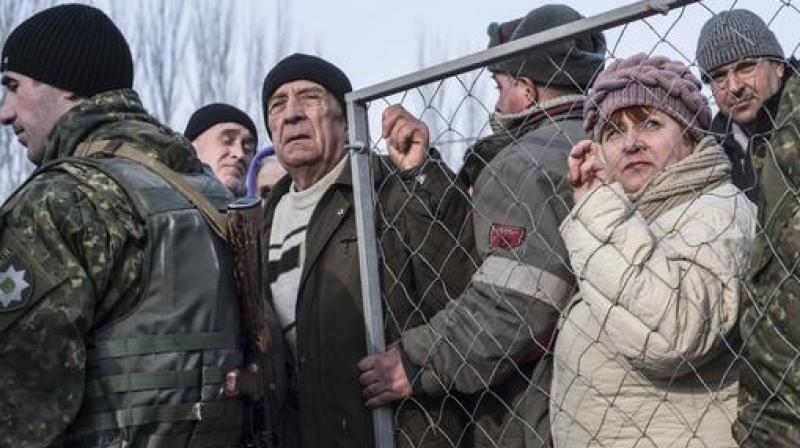Trump to speak to Poroshenko as Ukraine unrest surges

AVDIIVKA: US President Donald Trump was to hold his first talks with Ukraine's leader on Saturday as a surge in fighting killed dozens refocusing world attention on the conflict in Europe's backyard.
The phone conversation comes as the death toll hit 35 following a week of clashes between Ukrainian troops and Russian-backed insurgents in a level of bloodshed unseen in the eastern war zone since 2015.
The violence erupted as Trump seeks to build a friendship with Russia's Vladimir Putin with some analysts linking the escalation to the potential thaw in ties.
The scheduled call -- which will take place in the evening -- will see Ukrainian President Petro Poroshenko seeking to win assurances of Washington's continued diplomatic and non-lethal military support.
It comes a week after the new US leader spoke to Putin.
Russia and Ukraine along with the rebels on Wednesday signed up to calls for a ceasefire and the withdrawal of heavy weapons from the flashpoint town Avdiivka by Sunday.
But the demand for the shooting to stop has not halted the violence and so far there has been little sign of the big guns being pulled back around the Kiev-held industrial town of 25,000 at the centre of the fighting.
Power plant silenced
Correspondents on site said the night and morning passed relatively calmly compared to previous ones.
But the Ukrainian army said one of its soldiers had been killed in the area.
"Tonight, we saw shelling on the outskirts of Avdiivka but there were no major attacks on the city itself," regional police spokeswoman Nataliya Shyman said.
Most residents of this blue-collar town work in a major coke plant that has been heavily damaged by the shelling.
The town remained without electricity on Saturday and with only sporadic power supplies to heat homes against the freezing winter temperatures and limited supplies of water.
The giant plant provides electricity for much of the region and has been the target of previous deadly rebel attacks.
Plant spokesman Dmytro Murashko said that work brigades would try again Saturday to repair broken power lines after shelling halted their earlier efforts.
Friday was one of the bloodiest days with nine civilians killed - two of them inside the town.
The call to withdraw heavy weapons was made under the coordination of mediators from the Organisation for Security and Cooperation in Europe (OSCE).
It provides for the "withdrawal by 5 February 2017 into permanent storage sites of all weapons regulated by Minsk agreements to the distances defined in them and beyond the respective lines."
Sudden assault
The Minsk deal was signed in February 2015 and defined a step-by-step solution to one of Europe's bloodiest conflicts since the 1990s Balkans wars.
It has since been repeatedly broken - prompting Wednesday's meeting of negotiators to call for the warring sides to ensure "strict adherence to (a) full and comprehensive cessation of fire".
The separatists' sudden assault came after a month-long spell of relative calm in the 33-month war in an escalation that has sharpened the world's focus on the bloodshed in the European Union's back yard.
The conflict began shortly after Ukraine ousted its Russian-back leader in February 2014.
Moscow responded by annexing Ukraine's Crimea peninsula in March 2014 before allegedly plotting the eastern insurgency to keep Ukraine under its thumb after its tilt toward the West.
The Kremlin sees most of the former Soviet Union as part of its geopolitical sphere of influence.
That stance has been strongly disputed by Washington and European leaders such as German Chancellor Angela Merkel.
Washington's UN ambassador Nikki Haley on Thursday condemned Russia's "aggressive actions" in Ukraine - a surprising attack given Trump's supportive stance towards Putin.
Russia denies any responsibility for the conflict and blames the United States for igniting the protests that tilted Ukraine toward the West.

